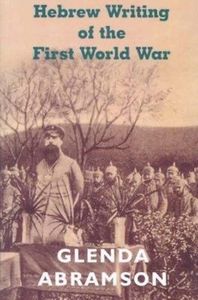Almost one and a quarter million Jewish soldiers took part in the First World War, spread through the armies on both sides of the conflict. Their numbers were more or less in proportion to the Jewish populations in the countries involved, and sometimes even greater. There is comparatively little writing about this experience in Hebrew. Those who did write novels, poetry, stories, memoirs and diaries in Hebrew were either serving soldiers on the Eastern Front and in Palestine, or civilians who were caught up in the war in one way or another. Their work reflected not only the tribulations of the trenches, but also the hardship suffered by civilians. Most of the Hebrew writers in Europe, including Shaul Tchernichowsky, Uri Zevi Greenberg and Yehuda Ya'ari, confront the Russian pogroms in their work. Starvation, illness and banishment were the lot of the Jews in Jerusalem and the Lower Galilee, and the appalling situation of the Jewish refugees was represented by memoirists, journalists and fiction writers such as Aharon Reuveni, L. A. Arieli-Orloff and Y. H. Brenner, all caught up in the trials of the wartime Yishuv. Woven into their views of the war is a portrait of the major transition taking place in Jewish political culture at the time, and their growing identification with Zionism. Interesting aspects emerge from these texts: Jewish nationalism became a crucial theme in view of what the Jews considered to be the permanent setting of Europe's sun. The texts raise the question of genre: fiction in relation to autobiography. Also the trauma of the war led to an abandonment of the prevailing literary styles and structures, and the Hebrew writers adopted some of the new modernist trends, Expressionism in particular.
Table of contents:
Acknowledgements (pp. ix-x)
Introduction (pp. xi-xxxviii)
Part I: In the Trenches
Avigdor Hameiri: The devil's idyll : the war poetry (pp. 3-21)
Avigdor Hameiri: In the lowest hell (pp. 22-67)
Uri Zevi Greenberg: Moonlight on the wire (pp. 68-110)
Shaul Tchernichowsky: The Poeta Magus (pp. 111-144)
Part II: Civilian Responses
Ad Hena: S. Y. Agnon in Berlin (pp. 147-180)
Yehuda Ya'ari and the Failed Experiment (pp. 181-212)
Two Telushim of Vienna: Gershon Shofman and David Vogel (pp. 213-258)
Part III: The War in Palestine
Aharon Reuveni's Devastation (pp. 261-297)
Arieli Orloff and the Flawed Mistress (pp. 298-328)
The Desert War: Ya'akov Hurgin and Yehuda Burla (pp. 329-347)
No Way Out: Y. H. Brenner and the War (pp. 348-377)
Glossary (pp. 378-379)
Select Bibliography (pp. 380-398)
Index (pp. 399-405)
